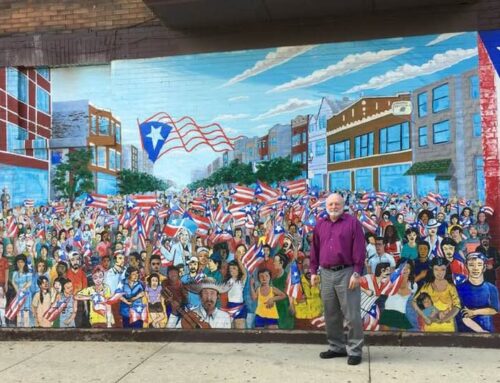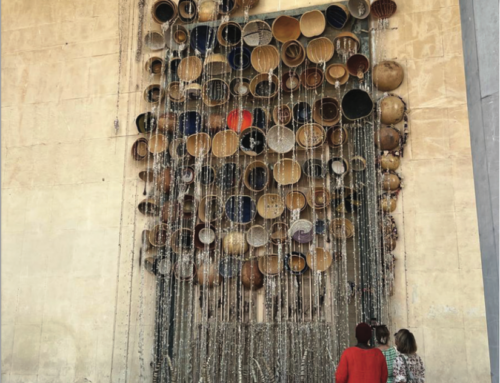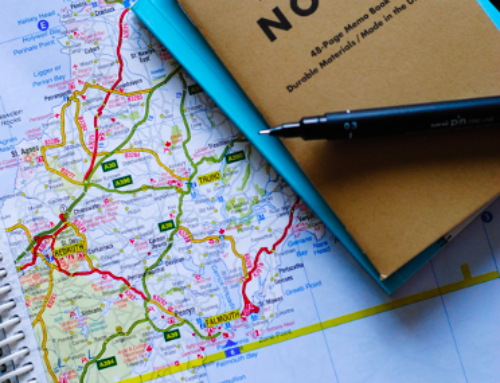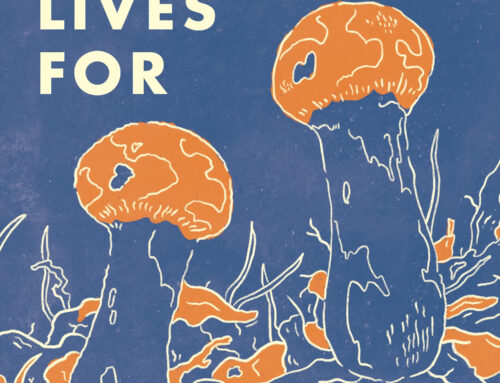by Alize Arıcan
AES is pleased to share this interview by Alize Arıcan, AES editorial intern, Ph.D. candidate at the University of Illinois at Chicago, with Hayal Akarsu, Junior Research Fellow at the Crown Center for Middle East Studies and Lecturer in Anthropology at Brandeis University, about her recent article in American Ethnologist, “Citizen Forces: The Politics of Community Policing in Turkey.”
The conversation explores the concept of citizen forces, limits of police reforms, vigilante violence and racist othering practices in Turkey and the United States, and ethnographies of policing and “repugnant others.”

A table mat from a prominent restaurant in Istanbul, memorializing neighborhood watchmen. The rhyme on the right reads as: “The coast is clear in our neighborhood, İzzet, Jale and Kemal are all sound asleep, and if you hear a whistle at night, it means your neighborhood watchman is here to keep you sleeping tight (Photo taken by author).
AA: Hayal, thank you very much for taking the time to talk about your work with us! In your article in the latest issue of American Ethnologist, you put forward the concept of “citizen forces” through an ethnography of policing in its many iterations in Turkey. Could you tell us a little bit about this concept? How does it illuminate our understanding of policing beyond Turkey, especially as alternatives to policing demand urgency?
Hayal Akarsu (HA): Thanks for having me, Alize. I explore how a reform effort to boost civilian oversight of the police ended up making some citizens into deputies of the police—or, what I call “citizen forces.” The split image of a person in the police poster—half in uniform and the other half as an “ordinary citizen”—inspired my thinking. With such images, police in Turkey claimed to be “citizens with uniforms,” oft-cited slogan of community-policing and democratic reform of the police globally since the mid-2000s. The police no longer associated with the heavy hand of the state as they did in 1990s but saw themselves as part of the social fabric, working in collaboration with citizens for ideally a less-policed society. In practice, however, community policing legitimized “police without uniforms,” as the member of a local vigilante group once told me. In Harmony Meetings (police-community forums) I attended, for instance, there was an enthusiastic demand for harsher policing of suspect Others, such as Syrian refugees, the urban poor, or political dissidents. Community policing in a sense empowered more citizens to own and remake the discretionary space opened by calls for their participation in policing, both locally and nationally.
Beyond Turkey, think about mottoes like “If You See Something, Say Something.” Such mottoes not only invite people to report on “something” as part of public responsibility, but they also give people discretionary power about what needs to be seen, reported, and policed. When so-called law-abiding citizens are interpellated as responsible and asked to participate in policing, they can easily turn into law-guarding and law-enforcing subjects. This constitutes the pervasive force of citizens. Analyzing this phenomenon helped me lay out the broader landscape of policing, the interplay between formal and informal agents of policing, and the ways in which policing regiments in quotidian practices. The question of how policing has been taken up by citizens—as valorized-subjects of a polity with associated duties, rights and responsibilities—is particularly important as right-wing populist regimes around the world fan the flames of nationalism and xenophobia. Yet I believe it is equally important to highlight how easy it is to act as an agent of policing if one subscribes uncritically to the idea of “responsible citizenship,” or discourses around political/social threats. As we reimagine community-oriented alternatives to law enforcement, it is crucial to keep in mind that communities can also act as ancillary police power.
AA: Your article does remarkable work in showing that authoritarianism is a long-term process entangled with liberalism instead of a “current moment” breaking with liberal politics. How do these entanglements—what you call “paradoxes of liberalism”— broaden our understanding of liberalism and authoritarianism in relation to policing in Turkey and beyond? And how do you relate these paradoxes to heightened discussions on reform-versus-abolition spurred by the uprising for Black lives in the United States?
HA: My ethnography covers a period of transition for Turkey (2013 onwards), from political liberalization to authoritarianism, reflecting President Erdoğan’s own political journey “from reformer to ‘new sultan’,” as one journalist put it. Yet, this was not just a linear transition from liberal forms of governance to illiberal and authoritarian ones, as political scientists would classify. Liberal reforms have been essential for the ruling AKP (Justice and Development Party) to consolidate its power and popularity, to establish an affective regime of care and citizenship, and to produce new forms of social control and surveillance. And the Turkish case is not an aberration. Instead, what we observe in Turkey crystalizes the contradictions of liberal police reform projects, which flow beyond borders. Most of my police interlocutors, for instance, took their European and American counterparts as reference points to justify security policies (such as crime-prevention programs or predictive policing technologies). Doing so purportedly expands the authority of the police in the name of improving the well-being and security of the citizens.
Of course, there are significant changes in the nature of the political, both in Turkey and globally. But racial policing did not start with Trump, and vigilante violence is not just the work of some angry majorities in Turkey. As anthropologists, we tend to analyze our ethnographic moments, intricate details of life and politics in close-up. What I suggest is broadening our temporal horizons as to better analyze the continuities and ruptures in political imaginations and apparatuses. We keep hearing about the crisis of liberal democracy in the face of illiberal right-wing movements and populist authoritarian regimes across the world. When uncritical, these rather nostalgic and alarmist lamentations revalidate liberalism as an abstract moral ideal. Born-again faith in liberal democracy, the rule of law, or the power of science, facts, and reason, might prevent us from analyzing the connections between liberal and authoritarian forms of government—particularly in terms of how much they limit or expand the field of policing.
Finally, why do many still hold on to the conviction that police reforms are inherently positive or progressive? Let’s not forget that the modern police institution itself is historically a product of reform, an attempt to gather different agents of power and violence under the monopoly of the state. The promise of reform has never been a total demolition of the police as a function but to give police a different form. Another way to put this would be to say that we ought not see police reform as a net reduction in state power (often working at the behest of private interests), rather it is a redistribution of it. As recent discussions on reform-versus-abolition reveal, liberal reforms can reproduce repression if racialized and punitive functions of policing are left untouched. Democratic reform initiatives can result in further securitization and militarization of society. The kind of citizen-police subjectivity I discuss in the article is not an inherently undemocratic condition or extra-legal form of violence. It is a subject position that the liberal reform of the police cultivates and legally sanctions.
AA: Since you conducted your fieldwork, the topics you explore have continued to be particularly salient in worldwide political discourse. In Turkey, the parliament has recently voted to arm watchmen (bekçi) and expand their authority; similar debates have emerged in Brazil on armed civilian forces, alongside those about (white) citizen vigilantes in the United States injuring or killing Black people, often with impunity. How do you see your work in conversation with these developments in policy and politics?
HA: Lived experience of policies and politics is what we study ethnographically as political anthropologists. Policies do not exist in a vacuum and they are not just top-down dictations. Exploring the role of the public in the making and execution of policing policies was the task I undertook in the field. I was struck with the popular support for the police: people lining up to take selfies with the police, submitting reports on “online informing” apps, or forming voluntary associations like People Special Operation (HÖH), mimicking the police SWAT teams, Police Special Operation (PÖH) units. People enthusiastically called for the return of the watchmen in the neighborhood meetings I attended. Some months after I completed my fieldwork, the watchmen system made a swift comeback, and recently, as you noted, they were granted with more rights – authorized to use guns or police the morality of neighborhoods. Still, this has not prevented the Directorate of Security in Turkey to launch new human-rights training programs for the watchmen. It is not surprising that these new recruits have been hired from among those vigilante groups who had already shown promise in policing.
Likewise, one cannot think of anti-Black racism in the USA without the figure of white vigilantes, inflicting racialized violence on Black and brown bodies. Recent examples include the killing of Ahmaud Arbery by two white homeowners in Georgia, or Amy Cooper who called the police on a Black bird watcher in Central Park, New York. They often act with assumed and actual impunity, and worse, most of the time, vigilante violence does not even fall outside of the law. Those who killed Ahmaud Arbery, for instance, claimed that Arbery “matched the description of a burglary suspect” and they exercised their legal right given under Georgia’s citizen’s arrest law. The racialized legal system grants authority to those privileged citizens, extending police’s capacity to harm with impunity to civilians. Just last week, the U.S. Immigration and Custom Enforcement Agency (ICE) announced that they will launch a six-week “Citizens Academy” course on immigration enforcement, including training for citizens in “defensive tactics, firearms familiarization and targeted arrests.” Note that the stated goals of the training include, “to build bridges with the community,” “engaging and educating the public,” who are expected “to get a transparent, insider’s view of ICE’s immigration enforcement operations.” As I discuss in “Citizen Forces,” those who share police’s monopoly over use of force belong to a large segment of society, not just blatantly right-wing, racist, or xenophobic ones.
In the case of Brazil, favelas in Rio de Janeiro are taken over by citizen-militias (including former police officers and firefighters), to whom state agencies outsource the policing of gangs and drug dealers. With their curious absence in slums, police in Brazil easily wash their hands off any liability; and even then, declare slums as crime-ridden hotspots, requiring tougher policing and military intervention. It is also not uncommon for state security agencies to arm civilians, paramilitary groups, gangs, or private security companies to do their ‘dirty work’ without accountability. Of course, no blanket approach could account for diverse forms of vigilantism, but I want to reiterate three points I make in Citizen Forces: First, vigilantism operates in a wide spectrum, from public lynching to the networks of so-called concerned citizens. Second, in many locales, legal, illegal, and para-legal forms of policing go hand in hand to remake the power of the state and the dominant socio-political economic order. Third, these conditions redraw the boundaries between state and nonstate policing (including private security firms), and between law-abiding citizens and vigilantes.
AA: Importantly, you illustrate that the production of citizen-police subjects draws on racist anxieties related to Others—something we’ve seen unfold in the United States for years. In Turkey, for example, Syrian refugees or Kurdish youth often occupy this space in the public consciousness. How do the dynamics of liberal reform generate or perpetuate the relationship between the making of citizen-police subjects and multiple forms of othering?
HA: Racial anxieties have formed the backbone of white vigilante violence and racist policing in the USA. Black and brown bodies are felt to be threatening to whites, and seen as threats to the dominant socio-economic and racial order, which leads to their disproportionate criminalization and incarceration. The “feeling,” or generally affective dimensions of this are important, as the laws in many jurisdictions legitimizing and legalizing lethal violence (e.g. so-called stand-your-ground laws) are based on the shooter claiming to have felt threatened. Who would “feel” threatened, by whom, where, in what situation is obviously racialized in a country like the USA. Meanwhile the “felt” nature of the alleged threat makes it difficult to refute—who could respond to someone saying they felt threatened, “No you didn’t”?
Likewise, citizen forces in Turkey have solidified longstanding national politics of difference and discrimination in everyday life. They have enforced the frontiers of proper citizenship toward either noncitizens, such as migrants or refugees, or toward non-deserving (“problematic, trouble-maker”) citizens such as ethnic/religious minorities, political, gendered or classed others. What community-policing did in the neighborhoods, for instance, was the expansion of the category of crime into noncriminal offenses like “causing public nuisance” or “loitering.” Labelling loitering as dangerous and dirty has become a powerful technology of othering, often targeted the unemployed poor (mostly, Kurdish youth) and Syrian refugees. People complained about strangers gathering in vacant or ruined buildings, making noise at night, or merely idling in groups on street corners and doing unspecified “suspicious things,” which might be selling drugs, vandalizing public parks, or plotting against the government. They bought into and sought out the promise of what police called “cleaning out” of their neighborhoods. As your work on urban transformation projects in Istanbul eloquently shows, “cleaning out” usually means the displacement, if not possible, surveillance of ethnic, racial, and sexual minorities involved in various informal economies of the city. This police rhetoric (“cleaning out”) has even had an appeal to those who have not historically been especially sympathetic to the police. For instance, anti-Arab and anti-Syrian racism were very common among Kurdish residents of Erince, a district of Istanbul where I conducted fieldwork. Residents’ perceived threats did not always correlate with the state’s security concerns. Yet tools of community-policing have made them valorize and use informing as part of active, vigilant, and responsible citizenship, offering feedback to police and being alert to what they have labeled “non-criminal yet threatening” behaviors. In this context, citizen forces take up a type of borderwork, ensuring that outcasts, newcomers, and marginalized groups remain outside the physical and social boundaries of the neighborhood.
AA: At the 2019 AES spring conference, you co-organized a roundtable about working with anthropology’s “repugnant others” (Harding 1991), which we also featured on the AE website. What are some methodological insights readers can derive from your current article, particularly involving working with “repugnant others”? How did your positionality and approach to fieldwork figure into this analysis?
HA: Putting a human face to complex political and social processes is what makes ethnographic inquiry unique, and I took this as a guiding principle in my work on police. But, my motive to contextualize (without justifying) the world of policing with its complexity and heterogeneity was sometimes understood as an attempt to “humanize the police” (i.e., Are you humanizing the police?!) I think the imperative to dehumanize the police builds on a liberal-moral assumption that depoliticizes humans as inherently good or innocent. This is a counter-productive way of understanding repugnant others, because then we give the impression that you’ll know a repugnant other when you encounter one, because they aren’t really human; and conversely, that the kind of power they exercise was/is not exercised by real people, but rather by monsters, etc. The (sad) fact is that one may torture prisoners by day, and then go home and be a doting husband, loving father, and dependable neighbor in the evening and on weekends. That is what this kind of power looks like when we study it ethnographically, which is crucial to appreciate how it can be woven into everyday life.
When I returned to the US in early 2017, many expected me to share “lessons to be learned from Turkey,” cautionary tales that redeem Western democracies during a time of democratic crises. Many commented: “Police reforms were good, but Turkish police failed to implement them properly.” As I discuss in Citizen Forces, the violent outcomes of reform projects I observed were direct consequences of the inherent contradictions of liberal police reform projects like community policing. Turkish police were not very different than their Western counterparts. So, for me, another challenge of working on “repugnant others” came in this post-field stage: How to write about the Turkish police without downplaying the Turkish state’s violence (or silencing the stories of those who suffer at the hands of the police), but also without exceptionalizing it?
My colleagues asked different versions of that similar question at the roundtable – Sahana Ghosh, Samar Al-Bulushi, Natalia Gutkowski, Haley McEwen. We have been working on countries (Turkey, India, Kenya, Israel, South Africa) that are despised as repugnant others of ideal liberal political orders because of their corruption, patriarchy, LGBT-phobia, settler colonialism, communalism, etc. Echoing Harding, we asked, how are we going to describe the inequalities and injustices in our field sites without Orientalizing the countries or actors we study? We all had a problem with the (self)representation of anthropology as a discipline as the voice of “suffering others.” This subject position, we believed, required a repugnant other in order to cast itself in a redemptive role. Relatedly, we wondered about the effect of declaring police as the repugnant other of anthropology. Let’s not forget that the discipline (not unlike the broader higher education system in the US) has played a significant role in the reproduction of racist ideologies and institutional arrangements, as well as various security/military/imperial projects. Overall, the roundtable was extremely productive in rethinking the politics of engagement, alignment, and othering in anthropological knowledge production and ethnographic praxis. We’re planning on a special issue, discussing these concerns, as well as other ethical and methodological challenges we faced while designing our projects, in the field, and in writing and publishing our ethnographies.
AA: Could you tell us about your broader project? What is next for you?
HA: Currently, I’m working on my book manuscript, based on my ethnographic research on the implementation of police reforms in Turkey. The book documents several reform projects (i.e. police education, legal reforms, social projects, community-policing, international security knowledge exchange, etc.), contingencies and complexities in the process of reform, and how these reforms made inroads to everyday police work and are contested by the public. In a way, I trace what police do with reform and what reform does to police and policing, if not preventing violence. By doing so, I show how reforms fashion a set of new governmental technologies and ways of knowing that significantly transform everyday experiences of security, especially for those who are now cast as sources of threat at different scales by these new discourses and practices of security and policing.
I’m also working on an article-length piece on digital policing technologies, a rapidly growing market in Turkey as elsewhere. I’m fascinated with techno-optimistic potentials attached to digital technologies, and police’s effort to harness these technologies into new regimes of surveillance and monitoring. I explore how digital technologies change police labor, and how imaginaries of technology inform both political oppression and resistance, tracing the emergent connections between the digital and the political in a global context.
Finally, I’m designing a second book-length project. I will look at the politics of environmental right-claims against the backdrop of synchronization attempts between European and Turkish legal regimes regarding a new category of crime, known as green crime. My preliminary essay on this topic entitled “Can you Murder a Tree?,” is forthcoming in Brandeis University’s Middle East Brief series. The piece focuses on recent political and legal clashes between government officials, environmental activists, international corporations, and local residents during anti-coal and gold-mining protests between 2016-2019. I analyze how involved parties securitized nature and the environment (e.g. “eco-slaughter” or “ecological-coup”) to pursue their unique claims and interests.
Cite as: Arıcan, Alize. 2020. “AE interviews Hayal Akarsu about “Citizen Forces: The Politics of Community Policing in Turkey,” American Ethnologist website, 28 August 2020, [https://americanethnologist.org/features/interviews/hayal-akarsu-citizen-forces-the-politics-of-community-policing-in-turkey]




